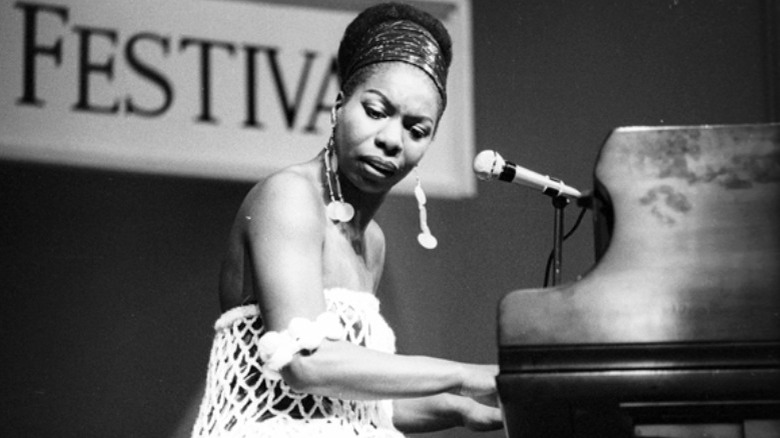Songs That Were Based On Real-Life Crimes
True crime is all the rage right now. Scroll through Netflix and you'll find any number of enticing crime documentaries begging you to click on them. The same goes for the plethora of podcasts, which make choosing which terrifying chapter of humanity you're interested in zeroing in on for an hour as easy as ordering off a menu. It's safe to say that we have a pretty serious fascination with the horrible atrocities mankind is capable of committing against its own species.
As Science Focus notes, one reason we might fixate on crime is to learn how to avoid danger and protect ourselves and our loved ones. It allows us to prepare defensive strategies that will hopefully come in handy if we're ever faced with similar situations ourselves. According to Lawyer Monthly, true crime also offers insight into our culture, allows us to flex our problem-solving skills, and quenches our natural thirst for justice. It also enables us to safely explore the darker aspects of humanity.
It's not surprising that crime is a frequent muse for artists. As JSTOR Daily notes, murder ballads are basically just true crime podcasts that have been around for centuries. The tradition continues to this day, with many musical artists mourning victims, pleading cases, and even examining the minds of killers through their creations. From Nina Simone's "Mississippi Goddamn" to Nirvana's "Polly" to Eminem's "Darkness," here are several songs based on real-life crimes.
The following article includes depictions of sexual assault, hate crimes, and child abuse.
Neko Case – Deep Red Bells
In her haunting 2002 murder ballad "Deep Red Bells," Neko Case recalls the terror of crimes that permeated her childhood. As Case told Perfect Sound Forever, she was living in Washington state in the 1980s and 1990s when Gary Ridgway, the Green River Killer, was actively killing women. As a junior high school girl, Case and her friends lived in constant fear of the serial killer. She told AV Club, "We'd go to school with steak knives in our pockets." Ridgway was America's deadliest convicted serial killer (per Britannica). By the time he was caught, he claimed he had killed around 80 women. He disposed of their bodies in remote wooded areas along the Green River.
Case told Perfect Sound Forever that at the time, the media devalued the importance of the victims' lives because they were sex workers. She wrote "Deep Red Bells" as a way of sympathizing with the women Ridgway murdered. Lines like "all those like you who lost their way, murdered on the interstate" and "when speckled fawns graze 'round your bones" wonder about the departed souls of the victims, while others like "who took the time to fold your clothes?" pay homage to their families (per Genius). As Case told AV Club, Ridgway was finally caught in 2001, shortly after she recorded the song.
The Smiths – Suffer Little Children
Despite its jolly guitar riff, The Smiths' "Suffer Little Children" tackles some pretty dark material. As Far Out Magazine notes, the 1984 song was inspired by the Moors murders, in which Ian Brady and Myra Hindley abducted and murdered five children between 1963 and 1965. The experience impacted young Morrissey, who grew up in Manchester, England — only a stone's throw from where the crimes took place — and might have wondered if he would be taken next.
According to All That's Interesting, Brady and Hindley — a couple — would lure children into their car, then drive them to the moors where Brady would sexually assault them before slitting their throats and burying them. In 1964, they snatched 10-year-old Lesley Ann Downey from a fair and took her back to a house. There, they tied her up and tortured her before killing her, even recording her cries for help.
Morrissey paid homage to the victims by name in the song, singing lines like "Lesley Ann with your pretty white beads" and "oh John, you'll never be a man" (per Genius). Other lyrics describe their final resting place: "But fresh lilaced moorland fields cannot hide the stolid stench of death." He also explored Hindley's possible remorse with lines like "Hindley wakes and says, 'Oh, whatever he has done, I have done.'" In 1998, Hindley finally told Independent her side of the story, claiming that Brady had abused her and forced her to help commit the atrocities.
If you or someone you know may be the victim of child abuse, please contact the Childhelp National Child Abuse Hotline at 1-800-4-A-Child (1-800-422-4453) or contact their live chat services.
Nina Simone – Mississippi Goddamn
According to Far Out Magazine, singer-songwriter Nina Simone started tackling racial injustice at the early age of 12 when a church asked her to play the piano but insisted that her parents had to sit in the back during the performance. She refused to play. Later, in 1963, she was so angry about the white supremacist-led 16th Street Baptist Church bombing in Birmingham, Alabama, that killed four young Black girls that she wanted to make herself a gun and go to war (per PBS).
Instead, she used her songwriting power to channel her rage into the creation of her first civil rights song. While it is deceptively jaunty and upbeat like a show tune, 1964's "Mississippi Goddamn" calls attention to several racist crimes that took place in the South in 1963. According to Simone (via PBS), writing the first verse — which starts with the line "Alabama's gotten me so upset" — felt like firing back at the Ku Klux Klan members who planted the dynamite in the Birmingham church (per Genius).
Meanwhile, the heated line "and everybody knows about Mississippi Goddamn!" references the racially motivated murders of Emmett Till and Medgar Evers in Mississippi (per Far Out Magazine). Per Britannica, 14-year-old Till was abducted from his bed after having an exchange with grocery store cashier Carolyn Bryant, a white woman. Bryant's husband and others beat Till before shooting him and dumping his body in a river. His tragic death is now viewed as a catalyst for the civil rights movement.
Interpol – Pioneer to the Falls
Interpol's spooky 2007 song "Pioneer to the Falls" is full of ominously vague lyrics like "show me the dirt pile," "the soul can wait," and "I pull the black from the gray" (per Genius). Its title, though, is very specific. According to The New York Post, on February 25, 2006, 24-year-old criminology student Imette St. Guillen was brutally murdered on a night out with friends after bar-hopping between two New York City bars: The Pioneer and The Falls.
At around 3 a.m. at The Pioneer, her friend called it a night but St. Guillen insisted on staying out. She continued on to The Falls, where her friend lost contact with her. As NBC News notes, her body was found wrapped in a blanket on the side of a remote road in Brooklyn the next day. She was nude, tied, and gagged with a dirty sock. Her face was wrapped in packaging tape and her ice-cold body was covered with cuts and bruises. The New York City medical examiner deemed it one of the most horrific murders she had ever seen.
An investigation led detectives to The Falls, whose bouncer, Darryl Littlejohn, was the last to see St. Guillen alive. According to The New York Times, blood found on the bindings matched Littlejohn's. Cell phone data also revealed that he had traveled to the location her body was found hours before its discovery. He was convicted of her murder in 2009.
Bob Dylan – Hurricane
Bob Dylan's epic eight-and-a-half-minute 1976 song "Hurricane" tells quite the tale. And, according to Far Out Magazine, it's all true. In its 19 verses, Dylan sings the story of Rubin "Hurricane" Carter, a Black boxer wrongfully convicted of a triple murder at a New Jersey bar in 1966. Lines like "the trial was a pig-circus, he never had a chance" and "though they could not produce the gun, the D.A. said he was the one who did the deed and the all-white jury agreed" explain how Carter was framed (per Genius).
Dylan learned of the injustice after reading Carter's autobiography in 1975 and went to visit him in prison before writing the song. Lyrics like "it won't be over 'til they clear his name and give him back the time he's done" got the word out about Carter's innocence, and Dylan even raised money through a benefit concert to support his defense. The efforts paid off. In 1976, Carter was granted a new trial but, unfortunately, was found guilty again. He was finally released from prison in 1985 after his conviction was overturned due to an unfair and racist trial.
The Killers – Jenny Was a Friend of Mine
Hailing from the same 2004 album that brought us "Mr. Brightside" is The Killers' bass-heavy murder ballad "Jenny Was a Friend of Mine." According to Last FM, the song was inspired by Robert Chambers' — aka the Preppy Killer's — defense statement in which he claimed he did not kill Jennifer Levin because she was a friend. Indeed, frontman Brandon Flowers sings "there ain't no motive for this crime, Jenny was a friend of mine" repeatedly throughout the song, along with more sinister lines like "she couldn't scream while I held her close" (per Genius).
According to People, 18-year-old Jennifer Levin and 20-year-old prep school student Robert Chambers had spent the early hours of August 26, 1986, drinking at Dorrian's Red Hand bar on New York City's Upper East Side. Per Town & Country, they left the bar together at around 4 a.m. and took a stroll in Central Park where, according to Chambers, they had consensual rough sex. Her body was found later that morning — she had been strangled to death. As People notes, Chambers had scratches on his face when police questioned him, and his stories changed constantly. He eventually confessed to her murder — though he claimed it was an accident — and later pleaded guilty to manslaughter.
Tom Waits – Georgia Lee
In 1999, Tom Waits released the mournful piano ballad "Georgia Lee." In his characteristic gravelly voice, he sings, "cold was the night and hard was the ground, they found her in a small grove of trees" before asking "why wasn't God there for Georgia Lee?" (per Genius). Per The Stringer, Waits wrote the song after hearing about the discovery of 12-year-old Georgia Lee Moses' body not far from his home.
According to NBC News, Moses and a friend had walked to a gas station near her home in Santa Rosa, California, on the evening of August 13, 1997. She was last seen leaving with a man. Nine days later, her remains were discovered in a grove of trees beside Highway 101 in Petaluma. Investigators determined that she had been strangled to death. To date, her killer has not been caught and police have no suspects.
In 2019, Phoebe Bridgers covered Waits' song (per Paste Magazine). Bridgers tweeted: "This song is about the murder of a 12-year-old Black girl named Georgia Lee Moses. No one published anything about her disappearance until after her body was found. It is important." In 2021, the Sonoma County Sheriff posted details about the murder on Facebook and offered a reward for information, suggesting a renewed interest in the case.
Le Tigre – Bang! Bang!
Rock band Le Tigre's angry 2000 song "Bang! Bang!" minces no words about its inspiration. The song opens with a female news anchor reporting: "In New York, the shooting of another unarmed Black man raises further questions about NYPD tactics" (per Genius). Later in the song, vocalist Kathleen Hanna sings "there is no f***ing way this is not about race" and "who's gonna call 911 when they can't tell a wallet from a mother***ing gun?" before yelling "bring me Giuliani's head." The song ends with the band counting to 41: one count for every bullet fired into Amadou Diallo (per Pitchfork).
According to History, Diallo, an unarmed Black man, was gunned down by four plainclothes police officers of the New York City Police Department's Street Crime Unit on February 4, 1999, when he reached into his pocket and pulled out his wallet. The officers claimed they mistook him for a suspect, although their accounts of what crime he was suspected of vary. They also allege that he had a gun. Per The New York Times, a similar crime took place on March 16, 2000, when several undercover police officers approached Patrick Dorismond and asked him where they could buy marijuana. A fight ensued, and one of the officers shot and killed Dorismond. As ABC News notes, the officers who killed Diallo were acquitted, and none of the police officers involved in Dorismond's death were charged.
Nirvana – Polly
Nirvana's 1991 song "Polly" has some truly bizarre lyrics like "Polly wants a cracker" and "I think she wants some water to put out the blowtorch" (per Genius). But once you know the story behind the song, they take on a much darker meaning. According to Far Out Magazine, frontman Kurt Cobain wrote "Polly" after reading a newspaper story about a real crime.
In 1987, a teen girl attended a rock concert at the Tacoma Dome in Washington State. On her way home from the show, she was kidnapped by Gerald Friend and held hostage at his house, where he raped her before hanging her from the ceiling and torturing her with a blowtorch. Luckily, the girl escaped with her life, and Friend is now in prison.
Curiously, Cobain sings the song from the perspective of Friend, the criminal, showcasing all of his warped and selfish thoughts. While it was misunderstood at the time, this was meant as a slight against flawed male thinking rather than sympathy for a rapist. When NME asked about the song in a 1991 interview, Cobain said, "The problem with groups who deal with rape is that they try to educate women about how to defend themselves. What really needs to be done is teaching men not to rape."
If you or anyone you know has been a victim of sexual assault, help is available. Visit the Rape, Abuse & Incest National Network website or contact RAINN's National Helpline at 1-800-656-HOPE (4673).
Sufjan Stevens – John Wayne Gacy, Jr.
In his 2005 concept album "Illinois," Sufjan Stevens set out to explore all of the state's history (per Treble Zine). Unfortunately, that history includes the infamous serial killer John Wayne Gacy. Per Britannica, Gacy killed 33 boys and young men in the 1970s, burying 29 of them beneath his house. As Treble Zine notes, Gacy was also known for raping and torturing his victims. He was caught in 1978 and executed by lethal injection in 1994 (per Britannica).
In his tender piano ballad "John Wayne Gacy, Jr.," Stevens explores some of the lesser-known details of the killer's life. The line "his father was a drinker and his mother cried in bed" (per Genius) paints Gacy's childhood as a bad one, and, indeed, his father was an abusive alcoholic (per Consequence). Stevens also mentions a swing set hitting young Gacy's head, which caused an injury that psychiatrists believe could have affected his behavior. Other lyrics describe his charm and his penchant for dressing up like a clown.
Things get a little dark when Stevens sings, "Look underneath the house there, find the few living things, rotting fast, in their sleep." He then goes on to describe the victims as "boys, with their cars, summer jobs" and explain how Gacy "put a cloth on their lips" — a reference to how he often drugged his victims with chloroform. The song ends with Stevens relating to Gacy on a human level, suggesting that we all keep secrets.
Rod Stewart – The Killing of Georgie
In 1976, Rod Stewart released a song called "The Killing of Georgie (Parts I and II)," which told the tale of a young gay man in London who was disowned by his parents after coming out and moved to New York City, where he thrived. As the song progresses, Georgie falls in love. One night while walking home from a Broadway play — "arm in arm, they meant no wrong" — a New Jersey gang attacks and kills Georgie (per Genius).
According to The Guardian, it was the first popular song to depict a hate crime against a gay man. But sadly, it wasn't fiction. Stewart knew a real gay man named Georgie who was a close friend of his former bandmate. Although he can't remember his last name, he describes Georgie as an attractive man who loved music. His affection is evident in the line "Georgie boy was gay I guess, nothin' more or nothin' less, the kindest guy I ever knew." Although Stewart admits that he took some creative liberties with the song's story, the general outline is true, and the real Georgie was tragically killed in a hate crime.
If you or a loved one has experienced a hate crime, contact the VictimConnect Hotline by phone at 1-855-4-VICTIM or by chat for more information or assistance in locating services to help. If you or a loved one are in immediate danger, call 911.
The Boomtown Rats – I Don't Like Mondays
With its cheerful piano melody, many people confuse The Boomtown Rats' 1979 hit "I Don't Like Mondays" for a cheeky take on working-class drudgery or hangovers. Nothing could be further from the truth. According to Ultimate Classic Rock, frontman Bob Geldof penned the song after hearing a disturbing news story. On January 29, 1979, 16-year-old Brenda Spencer took the rifle she got for Christmas and fired 30 rounds at the elementary school across the street from her home in San Diego, killing two adults and injuring eight children.
When a reporter asked Spencer why she did it, she said (via Ultimate Classic Rock), "I just did it for the fun of it. I don't like Mondays. This livens up my day." As The Vintage News notes, the crime was so heinous she was tried as an adult and given 25 years to life in prison. If you look past the song's joyful overtones, you'll find lyrics referencing the horrific event. In the chorus, Geldof sings "I don't like Mondays, I want to shoot the whole day down," and in one of the verses you'll find the line "school's out early and soon we'll be learning and the lesson today is how to die" (per Genius). Per The Vintage News, Geldof regrets writing the song because it made Spencer more famous.
Eminem – Darkness
Eminem's 2020 song "Darkness" — off the album "Music to Be Murdered By" — takes a pretty hard look at both mental illness and gun violence. As Newsweek notes, it references the 2017 Las Vegas shooting, in which Stephen Paddock killed 58 people by firing into the crowd of a country music festival from his hotel room 32 floors up.
The song — which samples Simon and Garfunkel's "The Sound of Silence" — has Eminem inside Paddock's mind as he sits in the hotel room, rapping lyrics like "feels like I'm loathing in Las Vegas," "I can see the whole venue from my window," "finger on the trigger, but I'm a licensed owner with no prior convictions," and "some of them John Travolta, staying alive by inches" (per Genius). The line "I don't wanna be alone in the darkness" is interspersed throughout the monologue, which, per Newsweek, suggests a struggle with mental illness. As if to drive the point home, the song ends with news coverage of several other mass shootings.
If you or someone you know needs help with mental health, please contact the Crisis Text Line by texting HOME to 741741, call the National Alliance on Mental Illness helpline at 1-800-950-NAMI (6264), or visit the National Institute of Mental Health website.
Perfume Genius – Lookout, Lookout
In 2010, singer-songwriter Perfume Genius explored one of the strangest crimes of all in his song "Lookout, Lookout." As Silent Radio notes, the lyrics of the tender piano ballad allude to the disturbing story of British child murderer Mary Bell. According to All That's Interesting, Bell committed her first murder on May 25, 1968, when she was just 10 years old. Days after she strangled 4-year-old Martin Brown, she asked his mother if she could view his body in the coffin. She also bragged to her classmates about killing Brown and even left notes confessing to the crime. No one took her seriously.
A few months later, Mary Bell — with friend and accomplice Norma Bell — strangled 3-year-old Brian Howe, mutilated his body with scissors, and carved the letter "M" onto his chest. When police questioned the neighborhood children about the crime, Mary slipped up and claimed she saw a boy with scissors hit Howe. Because the police had not mentioned scissors to the public, they realized that Mary was involved in his murder. Both Mary and Norma were tried, but only Mary was convicted. She served 12 years in prison and was released at age 23. She now lives in anonymity with a daughter of her own. In the song, Perfume Genius sings, "You carved out a name for yourself" (per Genius).














